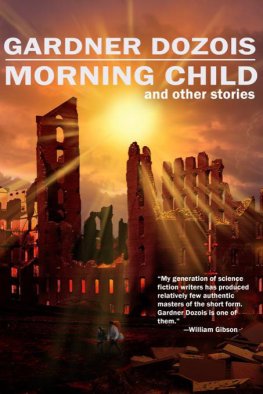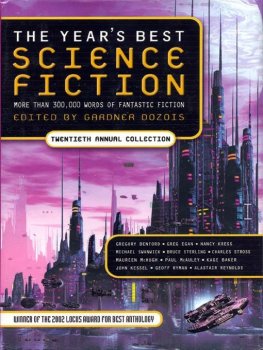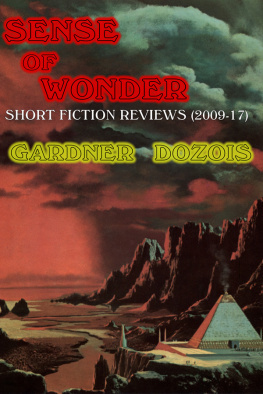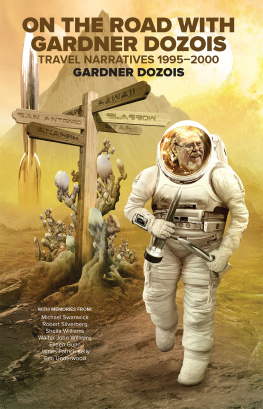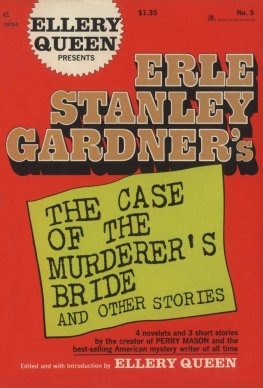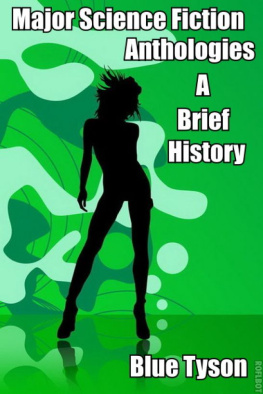Gardner Dozois - Morning Child and Other Stories
Here you can read online Gardner Dozois - Morning Child and Other Stories full text of the book (entire story) in english for free. Download pdf and epub, get meaning, cover and reviews about this ebook. City: New York, year: 2004, publisher: Baen Books, genre: Science fiction. Description of the work, (preface) as well as reviews are available. Best literature library LitArk.com created for fans of good reading and offers a wide selection of genres:
Romance novel
Science fiction
Adventure
Detective
Science
History
Home and family
Prose
Art
Politics
Computer
Non-fiction
Religion
Business
Children
Humor
Choose a favorite category and find really read worthwhile books. Enjoy immersion in the world of imagination, feel the emotions of the characters or learn something new for yourself, make an fascinating discovery.
- Book:Morning Child and Other Stories
- Author:
- Publisher:Baen Books
- Genre:
- Year:2004
- City:New York
- ISBN:9780743493185
- Rating:3 / 5
- Favourites:Add to favourites
- Your mark:
- 60
- 1
- 2
- 3
- 4
- 5
Morning Child and Other Stories: summary, description and annotation
We offer to read an annotation, description, summary or preface (depends on what the author of the book "Morning Child and Other Stories" wrote himself). If you haven't found the necessary information about the book — write in the comments, we will try to find it.
Morning Child and Other Stories — read online for free the complete book (whole text) full work
Below is the text of the book, divided by pages. System saving the place of the last page read, allows you to conveniently read the book "Morning Child and Other Stories" online for free, without having to search again every time where you left off. Put a bookmark, and you can go to the page where you finished reading at any time.
Font size:
Interval:
Bookmark:
Gardner Dozois
MORNING CHILD
and other stories
INTRODUCTION
by Gardner Dozois
The stories in this collection were published between 1970 and 2003, and thus represent a considerable chunk, perhaps a majority share, of not only my career but my life. Thirty-three years is a long time, longer than many unfortunate people even get to be alive, and, looking back across those three decades to the skinny, hungry, ambitious young kid in his early twenties who wrote the earliest of these stories, I sometimes wonder if were really the same person after all, if we really share anything except a tenuous continuity of memory, a belief that he was me that is based more on faith than evidence. Certainly when some critic asks me what was in my mind when I came up with a certain trope in one of those old stories, or what some bit of symbolism really means, why I chose some word or image instead of another, or sometimes even just what the specific inspiration for a story was, often I just cant tell himIm not that kid anymore, really, just someone who remembers having been him. Youd have to go back in a time-machine and ask the kid himself. He could tell youhe had an elaborately worked-out reason for every image and word-choice. But I no longer can.
Oddly, what I often can remember are the places in which they were written. So I remember clearly the office where I worked as a reporter and features editor for an Army newspaper on a small Army base near Nuremberg, Germany, and how Id sneak back to the office after duty hours and write on the old manual standup office-model typewriters they had there, which used long continuously scrolling rolls of yellow paper instead of regular sheets of typing paper, which made it uneasily like writing on toilet paper. I wrote A Dream at Noonday, the earliest story in the book, in that office, with an ear cocked all the while for some prowling insomniacal officer in the corridor outside, since I wasnt supposed to be using office equipment after hours for my own private non-duty-related purposes, and it wouldnt do to get caughtparticularly if he paused to actually read the kind of fierce anti-war, anti-Army sentiments I was producing in stories like A Dream at Noonday. Oh-oh! But fortunately, no such unlikely night-stalking officer ever came in, all of them being either home snug in their beds or whooping it up at the Officers Club with the USO girls we enlisted men werent allowed to date. A Dream at Noonday was probably the first story where I punched through to a higher level, produced something a quantum jump better than what Id been producing before, and, unusually for me, before or since, I wrote it all in one sitting, writing at a white-hot pace for hours, the yellow paper scrolling up out of the typewriter and spooling in piles on the desk, and when Id typed the last word, I slumped against the typewriter, trembling and drenched with sweat, feeling that Id actually become a writer at last.
I remember the little German farming village in which I started A Special Kind of Morning, pacing the deserted streets at four o clock in the morning as I plotted it, shaggy new beard and hair (for I was a civilian again by then) and long black raincoat flapping as I strode along almost at a run, no doubt scaring the bejesus out of any villagers I happened to meet the tiny attic garret which I shared with two other expatriate ex-soldiers and whatever tourist-hippie girlfriends wed managed to coax up there with us, the smell and hiss and blue-flame crackle of the small propane heater that was all that kept us from freezing solid in the bitter German winter, living for a month on a box of oxtail soup bouillon that a passing hitchhiker whod crashed there for a night had given us, because we had no money to buy anything else, trying to work in an apartment that was almost literally too small to turn around in, small as a space capsule, full of other people strumming guitars and playing Steppenwolf or The Doors at full volume on a tiny plastic portable record-player (often at the same time), people kissing and making-out on the couch in one corner, while other people waved their hands and carried on even-more-passionate political or metaphysical/religious/cosmological conversations a few feet away, settling all the problems of the universe and unraveling all its mysteries and I remember the somewhat larger but much more filthy and rundown sixth-floor walkup apartment on East 10th Street in the East Village in New York City in which I finished that story, having advanced from oxtail soup bouillon to living on a box of six frozen veal cutlets that could be purchased for ninety-nine cents a week (you eat a veal cutlet sandwich a day, and on the seventh day, you have a ketchup or mustard sandwich instead), typing throughout the night, silent enough in the apartment to hear the rustling of the tides of cockroaches washing over the dirty dishes in the pitch-black kitchen when you stopped typing for a minute, unless the trash trucks were howling and banging outside, or a police car was screaming by, or someone was getting shot. I wrote Machines of Loving Grace in the bathroom of that same apartment, sitting on the toilet and writing in longhand in a three-ring notebook throughout another freezing Manhattan night, describing the room around me, which was also the setting for the opening scene of the story, as accurately as I could, while dawn actually was just beginning to color the sky outside the streaked, dirty window. A Kingdom by the Sea was written in that apartment too, and in various all-nite eateries up and down Eighth Street and Fourteenth Street between the East and West Village, where I sat nursing a cup of coffee and scribbling in longhand in coffee shops packed with hippies and Jesus Freaks and transvestites and junkies.
Chains of the Sea was largely written in my cramped two-room apartment in an equally run-down but somewhat cleaner brownstone building in the Fairmount section of Philadelphia (which, oddly, is only a few blocks away from where Im living now, after having skipped around to live in other parts of the city in the thirty intervening years), or in my girlfriends larger but even more dilapidated apartment on South St. when I was over there to visit, back when South St. was still a slum where only the poorest of hippies, black folk, and bohemian artists lived, interspersed with a few sad-looking old Jews left over from when the neighborhood had been a de facto Jewish ghetto. Less gentrified then than it is now, the most common sound to be heard in my own neighborhood in Fairmount, when I stopped typing late at night and raised my head from staring at the typewriter keys, was the howling of feral dogs. The only other sound would be the tap-tap-tap of my manual portable typewriter when I started typing again; this neighborhood didnt even get the crashing garbage trucks, the screaming police cars, or the gunshots. The rooftops outside my window, across the alley, were strung with tripwires to catch roof rabbitthe stray cats that ghosted along the roofs in the hours before dawn. Along about two or three in the morning, a small brown mouse would come out of a hole in the baseboard and rummage through the trash in the kitchen; I worked in the bedroom, at a typewriter set up on the dresser, and if I poked my head into the next room, the mouse would vanish, only to reappear instantly the moment I went back to work. Occasionally, my cone-shaped old Italian landlady would come up the stairs and scream up at me to stop typing and shut off the light and go to bed like a decent person. Once she went into my apartment while I was gone and replaced all my 100-watt bulbs with 25-watt bulbs, because she said that the 100-watt bulbs were using up too much electricity and costing her money (I moved a short while later).
Font size:
Interval:
Bookmark:
Similar books «Morning Child and Other Stories»
Look at similar books to Morning Child and Other Stories. We have selected literature similar in name and meaning in the hope of providing readers with more options to find new, interesting, not yet read works.
Discussion, reviews of the book Morning Child and Other Stories and just readers' own opinions. Leave your comments, write what you think about the work, its meaning or the main characters. Specify what exactly you liked and what you didn't like, and why you think so.

